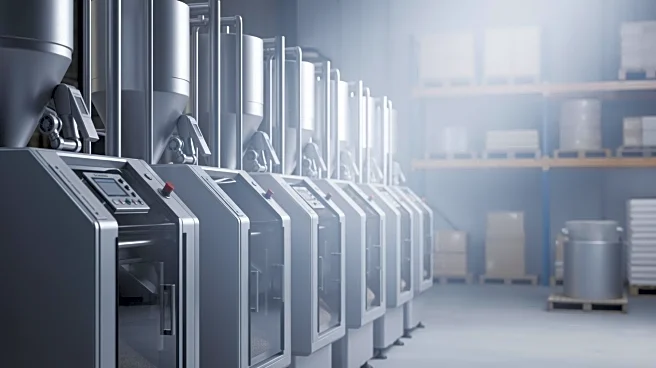What's Happening?
The food and beverage manufacturing industry is currently experiencing significant economic challenges due to rising production costs and new regulatory burdens. According to a report from the Food and Drink Federation, 41 percent of businesses in this
sector have reduced their growth expenditures. This contraction in investment is attributed to increased costs for raw materials and a low confidence index of -43 percent in the first quarter of 2025. To combat these challenges, companies are turning to digital transformation initiatives, which have the potential to improve plant performance by 10 to 20 percent. Cody Bann, vice president of engineering at SmartSights, highlights the importance of evaluating strategic plans and adapting to the changing business environment to meet industry goals.
Why It's Important?
The economic pressures faced by the food and beverage manufacturing industry have broader implications for the U.S. economy and consumer markets. As manufacturers scale back investments, there could be a slowdown in innovation and productivity within the sector. This may lead to higher prices for consumers and reduced competitiveness for U.S. manufacturers on a global scale. The industry's response, through digital transformation, could serve as a model for other sectors facing similar challenges. However, the success of these initiatives will depend on the ability of companies to effectively integrate new technologies and address labor and skills gaps.
What's Next?
As the industry navigates these economic challenges, companies will likely continue to explore digital solutions to enhance efficiency and reduce costs. Stakeholders, including industry leaders and policymakers, may need to collaborate to address regulatory burdens and support workforce development. The outcome of these efforts could influence the future trajectory of the food and beverage manufacturing sector and its role in the U.S. economy.
Beyond the Headlines
The shift towards digital transformation in the food and beverage industry raises important questions about the future of work and the role of technology in manufacturing. As companies adopt new technologies, there may be ethical considerations regarding job displacement and the need for reskilling workers. Additionally, the industry's ability to adapt to these changes could have long-term implications for sustainability and environmental impact.















